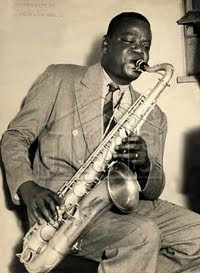SpokFrevo Orquestra
.jpg) The excellent Brasilian big band, SpokFrevo Orquestra, will be on tour in Europe during June and July. The band was formated in 1996 and comes from Recife, Pernambuco (- North East of Brazil) and has specialized in performing up-dated arrangements of frevo - one of the most vital music traditions of the North East of Brazil. The SpokFrevo Orquestra is led by Inaldo Cavalcante de Albuquerque (- known as conductor Spok), who also accumulates the roles of saxophonist, arranger and music director. The band consist of 18 members, all highly skilled musicians - together they make music that not just invites, but drags the listener´s attention. The frevo is and has been closely connected with the carnaval tradition of Recife, Pernambuco, and the music of this orchestra will drag you into the mood of carnaval and having a party.
The excellent Brasilian big band, SpokFrevo Orquestra, will be on tour in Europe during June and July. The band was formated in 1996 and comes from Recife, Pernambuco (- North East of Brazil) and has specialized in performing up-dated arrangements of frevo - one of the most vital music traditions of the North East of Brazil. The SpokFrevo Orquestra is led by Inaldo Cavalcante de Albuquerque (- known as conductor Spok), who also accumulates the roles of saxophonist, arranger and music director. The band consist of 18 members, all highly skilled musicians - together they make music that not just invites, but drags the listener´s attention. The frevo is and has been closely connected with the carnaval tradition of Recife, Pernambuco, and the music of this orchestra will drag you into the mood of carnaval and having a party.Last year was the official centennial of the frevo with a lot of celebration events, including oncerts and the carnaval of Recife, Pernambuco, of course. The SpokFrevo Orquestra was a part of it all and had great success with its performance. One of the concerts was recorded live and has now been released on both cd and dvd. Learn more about the contents by clicking the picture below.
 The SpokFrevo Orquestra's official website (- also in English) has more information about the band, including a calender announcing the band's tour schedule.
The SpokFrevo Orquestra's official website (- also in English) has more information about the band, including a calender announcing the band's tour schedule.
I am proud to learn that the band will play the official opening concert at Copenhagen Jazz Festival on July 4th, without doubt a great take-off of the festival that celebrates its 30th season this year.
To give you an impression of the SpokFrevo Orchestra in action, I insert an uploaded video-fragment from the concert recorded at the mentioned dvd.













